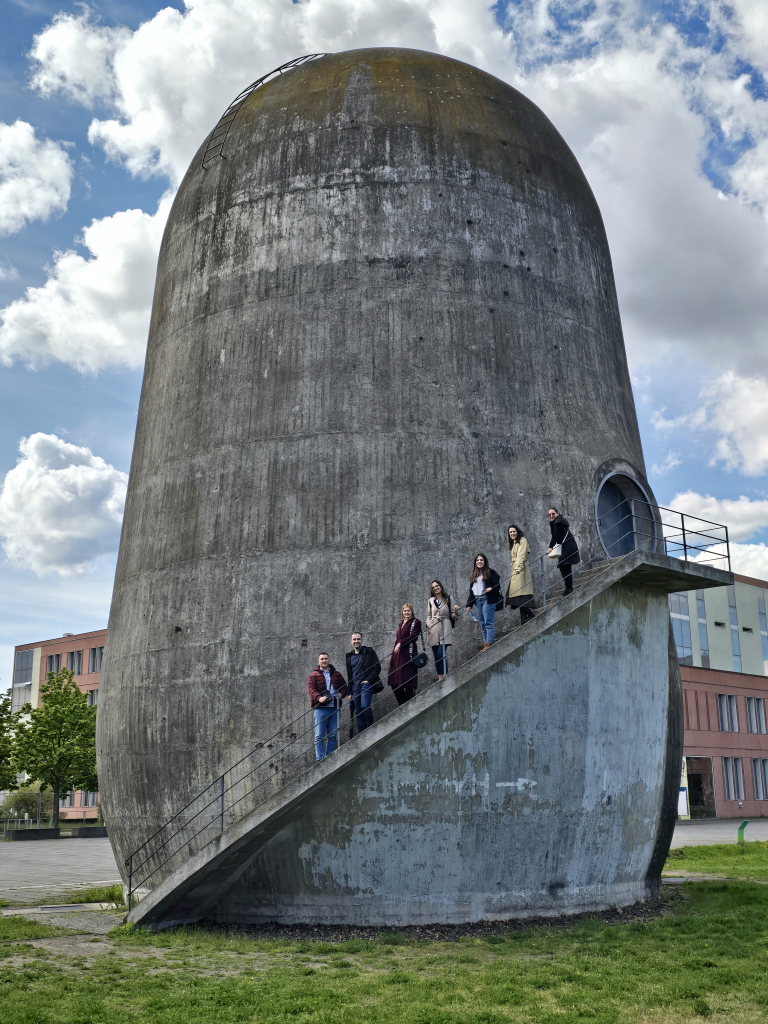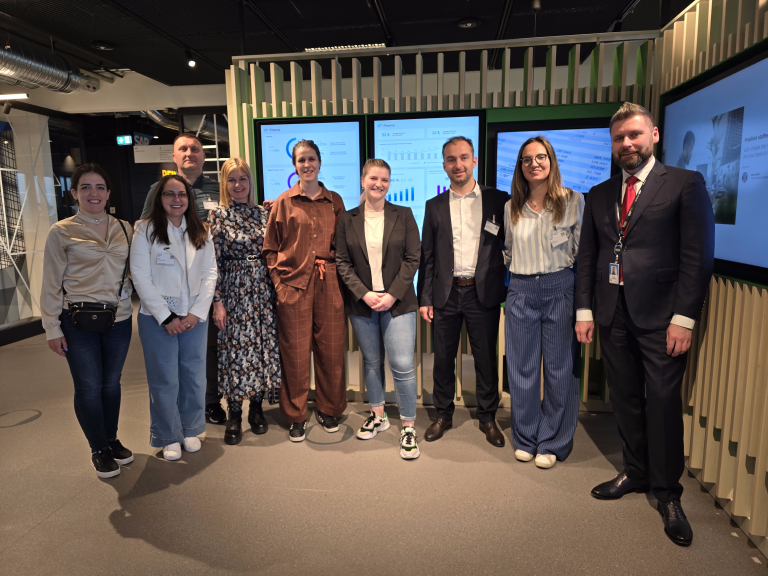Germany, a country renowned for its technological brilliance and environmental consciousness, was the perfect destination for our study visit. From April 17 to 23, 2024, a small delegation from Montenegro embarked on a journey through the world of innovation, sustainability, and high-tech achievements. Each day brought new discoveries, inspiration, and the opportunity to establish valuable contacts. Here is the story of our journey, which was far more than just business—it was an exploration of the future.

Our arrival in Berlin was filled with excitement and anticipation. The first destination was the Adlershof Technology Park, something like a scientific Disneyland built on the site of a demolished aircraft factory from World War II. Frank, our guide, took us through corridors filled with high-tech equipment and laboratories, bringing each corner to life with historical and success stories of companies that originated there. Although Adlershof has always been a place of innovation, being there made me reflect on how genius and technology, if not in the service of humane ideas, can become the cause of much human suffering. At the same time, it occurred to me how many unused spaces in Podgorica could, with small investments, be transformed into creative centers that would awaken the research and entrepreneurial spirit in our community. From then until the end of my stay in Germany, I often sighed, struck by the thought that we lacked exactly such a space when my brother and I tried to make a “small helicopter” while we were still in elementary school.
After Adlershof, we stepped into the world of cybersecurity with a visit to DCSO. Christin Wilkenman guided us through their offices, showing us the relaxation and game areas for team building. When she mentioned the annual subscription fee of 4000 euros for community membership, we realized how seriously Germany takes the protection of digital resources.
We ended the day at the EUREF Campus, a green epicenter for sustainable energy technologies. Ursula Hermann led us through this “city within a city,” where technology and sustainability merge in an inspiring way. Seeing the solar panels, wind turbines, and wastewater recycling systems, we left the campus filled with ideas and enthusiasm.
The second day began at the Embassy of Montenegro in Berlin. It was nice to feel at home as we discussed collaboration opportunities and market trends in Germany. As we were told, despite being in a recession and facing a massive influx of migrants, Germany has liberalized the conditions for acquiring citizenship and increased the quota for admitting foreigners, especially those with STEM skills. Now, instead of 10 years, it takes 7 years of residence to acquire citizenship, and this year alone, they will admit up to 50,000 people from our region. The main reasons for this decision, as Zdravko Jovović and Dijana Ralević, who were our hosts and support in organizing this study visit, told us, are the aging population and the shortage of labor.

After the embassy, our journey took us to Hubraum and T-Labs, the research center of the Deutsche Telekom Group. Their story about investing in startups that use WiFi sensors was fascinating. In the future, telco operators will be able to identify the number of people in a room, the presence of animals, heartbeats, pulses, and much more through routers emitting WiFi signals. For instance, if you happen to choke on popcorn while watching a movie and lose consciousness, your router will send an alert to emergency services, signaling them to activate sirens and come to your aid. Similarly, if an elderly person is alone at home, the router can identify their fall anywhere in the space and send a notification to their caregiver. Of course, this technology raises numerous privacy concerns, such as where the reach of WiFi signals ends—what if a neighbor’s router can identify changes and movements in my apartment? In the face of such questions, even GDPR, the privacy guardian within the EU, remains silent. Hubraum is currently seeking creative ideas for the application of WiFi sensing technology, and anyone with an idea can present it to their team. If they like it, they will provide financial support, engineering expertise, and their infrastructure for testing the idea.
At Urban Impact Agency, we were welcomed by Sophie Persieghl, who shared their story about projects that transform urban environments. Their platform, which maps and dissects the entire innovative ecosystem, showed us how dedicated they are to changing the world for the better. The “Sustainability Challenge” project combined innovation and sustainability in a way that inspired us all.
The evening meeting with BVIZ was a true discovery. Dr. Christina Quensel and Denny Droßmann shared with us their vision for supporting technology centers across Germany. Their energy and passion for innovation left a strong impression on us.

The third day brought a series of meetings with potential partners. At GTAI, we discussed the possibilities of establishing companies in the German market. Isabel da Silva Matos and Anja Quiring talked about the support available to foreign companies and the challenges of bureaucracy. Sarah Gholiha from the Startup Hub Initiative Germany showed us how easy it is to get support if you produce something rather than just offering services. Representatives from the ICT cluster Berlin Partner were also present, with whom we discussed sustainability models for clusters.
The visit to Ahoy coworking space shattered our perception that everyone in Germany is as punctual as a “Swiss watch.” With many delays and on-the-spot changes to the initial agreement, we proceeded with the planned meeting with Michael Gannon from Stun and Awe, a consultant for international business development with decades of experience. His vast experience and advice gave us insight into the challenges and advantages of starting a business in Germany.

The fourth day was dedicated to exploring Berlin. Walking through the city, tasting local specialties, and preparing for the journey to Hannover were our ways of gathering impressions and refreshing our energy. We visited famous Berlin landmarks, enjoyed coffee by the Spree River, and talked about all the things we had seen and learned.
Hannover welcomed us with the grand opening of the Hannover Messe 2024. The atmosphere was incredible, and speakers like Ursula von der Leyen and Chancellor Olaf Scholz made the ceremony unforgettable. We joined the crowd at the networking event, which lasted until late hours, exchanging ideas and contacts with people from around the world.
The last two days of the fair were true technological marvels. All those exhibitors, from Google to Microsoft, showcased their achievements in artificial intelligence and automation. We walked among the latest technological innovations, absorbing knowledge and establishing contacts that will be crucial for the future of our companies. Seeing how technology is used to optimize resources and reduce negative environmental impact was inspiring and encouraging.

Our trip to Germany was far more than just a regular business mission. It was an exploration of the world of innovation, learning from best practices, and establishing contacts that will shape the future of our companies. Germany taught us that innovation is not only about technology but also about mindset. We returned full of new ideas, inspiration, and ready for new challenges.